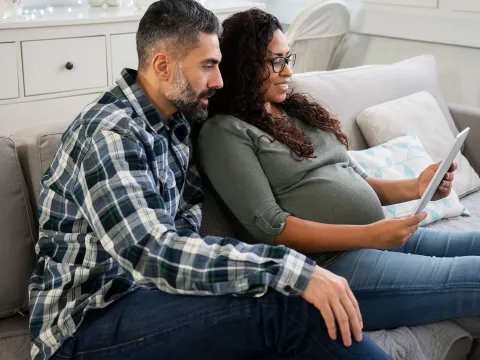- AdventHealth

Having a baby should be a joyous experience. But if you’re pregnant and potentially giving birth during the coronavirus pandemic, you might have questions and concerns about your health and safety — and that of your newborn.
Here’s what you should know about your health risk at this time.
Are Pregnant Women at Higher Risk for Coronavirus?
The CDC says there is not a lot of reliable information yet about how coronavirus spreads and the risk to pregnant women. However, because pregnant women are at higher risk for serious illness from related respiratory infections, such as the flu, the CDC recommends taking proper precautions to avoid COVID-19.
Those who are pregnant should be monitored since they are known to be at risk for severe viral illness. But current data has not shown pregnant women to be at an increased risk for coronavirus disease (COVID-19).
How Can Women Stay Healthy During Pregnancy?
You can help protect yourself from coronavirus before your baby is born by taking
the same steps to avoid infection as the general public. These include:
- Avoiding people who are sick
- Cleaning your hands often with antibacterial soap and water or using an alcohol-based hand sanitizer
You can find additional prevention steps on the CDC’s Website.
Are Hospitals Prepared for Coronavirus?
Hospitals, including those that offer maternity and newborn care, follow recommended guidelines from the CDC regarding how to limit the spread of a contagious illness, like coronavirus. This includes training for all health care personnel on how to safely care for laboring mothers and their newborns to prevent the risk of infection with COVID-19 or other contagious illnesses.
What if a Woman Gets COVID-19 Before Delivery?
If you are diagnosed with COVID-19 or think you might have been exposed to coronavirus in the days before your delivery, contact your doctor for instructions on what to do. You should also let the hospital know before your arrival so they can take appropriate infection control measures to prevent the spread of the illness.
Can Coronavirus Be Passed to a Baby During Birth?
According to the CDC, it is still not known whether coronavirus can be passed from a pregnant woman to her baby during pregnancy or delivery.
There is also little known about the risks of preterm delivery or other medical problems in infants born to women who tested positive for coronavirus during pregnancy. According to the CDC, “There have been a small number of reported problems with pregnancy or delivery (e.g., preterm birth) in babies born to mothers who tested positive for COVID-19 during their pregnancy.”
Are Newborns at Higher Risk of Severe Illness From Coronavirus?
According to the CDC, it is not clear whether newborns are at higher risk of severe complications from coronavirus. If you have COVID-19, your health care team may talk with you about temporarily separating you and your infant after birth to reduce your baby’s risk of getting the virus.
If you have coronavirus and decide to keep your baby in your room, your health care team will recommend precautions that could reduce your baby’s risk of catching the virus. These may include:
- Keeping a curtain between you and your baby and staying at least 6 feet away as much as possible
- Wearing a face mask, if available, and washing your hands thoroughly before feeding or having other close contact with your baby
Is It Safe to Breastfeed With Coronavirus?
There is still much unknown about whether this virus and other types of coronaviruses can be spread through breastmilk. Although these viruses have not been found in breastmilk, it’s not clear whether the virus can be passed from a mother to her baby through her breastmilk. However, there is a risk of spreading the virus through droplets from coughing or sneezing.
Until more is known, the CDC recommends that the new mother and her health care team should decide whether to breastfeed based on her individual risks. If you do decide to breastfeed, you should take all possible precautions to avoid spreading coronavirus to your newborn. These precautions include:
- Expressing your breastmilk with a breast pump and having someone who is not sick feed the baby (wash your hands before touching the pump or bottle parts and follow the CDC’s recommendations for cleaning the pump)
- Washing your hands before touching your baby
- Wearing a face mask, if available, during the feeding
Get the Latest on Coronavirus
We’re here to support you through pregnancy, birth and beyond. You can find updates and information on coronavirus, including answers to frequently asked questions, on our Coronavirus Resource Hub. You can also sign up for email and text notifications to stay up-to-date on the latest news from AdventHealth.



